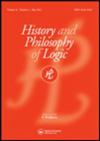The Logic of Gilles Deleuze
IF 0.5
3区 哲学
Q3 HISTORY & PHILOSOPHY OF SCIENCE
引用次数: 2
Abstract
logical movement of ‘mediation’. They want to put metaphysics in motion, in action. They want to make it act, and make it carry out immediate acts. It is not enough, therefore, for them to propose a new representation of movement; representation is already mediation’ (Deleuze 1994, 8). Here, I think, Deleuze would say that Priest attempts to put the discrete multiplicity of classical logic in motion, rather than recognise the need for a non-propositional account of problems, such as Deleuze develops. As such, my suspicion is that Shores in the end collapses the difference in kind between the two multiplicities that is at the heart of Deleuze’s logic of multiplicities. Shores notes in the conclusion of the work that this is the opening of a broader project on Deleuze and logic, so perhaps these issues will be resolved as the project develops. I suspect Shores would see much of his work here as a provocation to further thought, and he notes that while Priest’s logic offers the best mapping of Deleuze’s logic, this mapping does not cover the whole range of Deleuze’s thought. In providing such a provocation, the book is a success, and despite the reservations above, I would recommend it to those interested in this intersection of Deleuze and logic. Ultimately the engagement with formal logic here is well worked out, with the clearest analyses of Deleuze’s engagements with the philosophy of logic so far available to us.《吉尔·德勒兹的逻辑
“调解”的逻辑运动。他们想把形而上学付诸实践。他们想让它行动,让它立即行动。因此,对他们来说,提出一种新的运动表象是不够的;“表象已经是中介”(德勒兹1994,8)。在这里,我认为德勒兹会说,普里斯特试图将经典逻辑的离散多样性置于运动之中,而不是像德勒兹所发展的那样,认识到需要对问题进行非命题性的解释。因此,我的怀疑是,肖尔斯最终消解了德勒兹多重性逻辑的核心——两种多重性之间的种类差异。肖尔斯在作品的结论中指出,这是一个关于德勒兹和逻辑的更广泛项目的开端,因此,随着项目的发展,这些问题可能会得到解决。我怀疑肖尔斯会把他在这里的大部分工作看作是对进一步思考的挑衅,他注意到,虽然普里斯特的逻辑提供了德勒兹逻辑的最佳映射,但这种映射并没有涵盖德勒兹思想的全部范围。在提供这样的挑衅方面,这本书是成功的,尽管上面有保留意见,我还是会把它推荐给那些对德勒兹和逻辑的交集感兴趣的人。最终,这里与形式逻辑的接触得到了很好的处理,对德勒兹与逻辑哲学的接触进行了迄今为止最清晰的分析。
本文章由计算机程序翻译,如有差异,请以英文原文为准。
求助全文
约1分钟内获得全文
求助全文
来源期刊

History and Philosophy of Logic
综合性期刊-科学史与科学哲学
CiteScore
0.80
自引率
0.00%
发文量
24
审稿时长
>12 weeks
期刊介绍:
History and Philosophy of Logic contains articles, notes and book reviews dealing with the history and philosophy of logic. ’Logic’ is understood to be any volume of knowledge which was regarded as logic at the time in question. ’History’ refers back to ancient times and also to work in this century; however, the Editor will not accept articles, including review articles, on very recent work on a topic. ’Philosophy’ refers to broad and general questions: specialist articles which are now classed as ’philosophical logic’ will not be published.
The Editor will consider articles on the relationship between logic and other branches of knowledge, but the component of logic must be substantial. Topics with no temporal specification are to be interpreted both historically and philosophically. Each topic includes its own metalogic where appropriate.
 求助内容:
求助内容: 应助结果提醒方式:
应助结果提醒方式:


